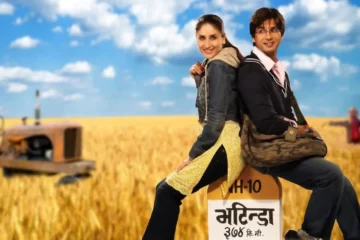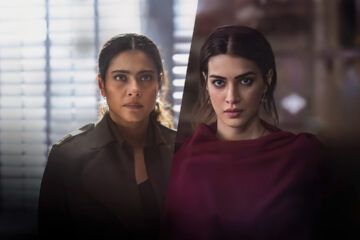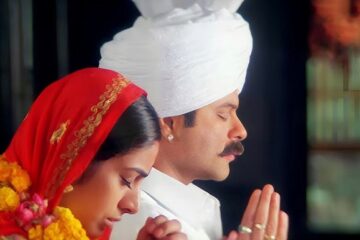Name another Bollywood movie except Zindagi Na Milegi Dobara, that’s about road trips, facing your fears, finding happiness, and the meaning of friendship. We’ll wait.
You know a movie has become immortal when its dialogues can seamlessly be used in everyday life without skipping a beat.
Exhibit A.
We flew home to surprise my parents for the new year, only to find that my nephew, the first grandchild, couldn’t make it because of his mid-terms. This is word-for-word how the interaction between uncle and nephew went as I tried to convince him to come on over for a family reunion so that we could stay up all night and watch the same film that we’ve been watching every homecoming since the year it came out.
ME: “Eddie yaar, ditch na kara yaar. Teri wajaah se pehlay bhee yeh plan drop hua tha.”
EDIE: “Monday ko ana was not funny. Meray papers ke beech mein ana WAS NOT FUNNY!!”
ME: “Haan tau aagaya na yaar, hogayi ghalty, ab kia karoon sorry Eddie ka board pehan ke ghoomoon?”
EDDIE: “Grow up, man!”
ME: “Mushi Mushi!”
*We’re happy to report that just like Hrithik’s Kabir in the movie — which you all must’ve guessed by now — Eddie finally came home. Furthermore, he managed to clear all his mid-terms and neither uncle nor nephew had to run with any bulls. Or an angry mom.
This is what great storytelling does: create characters that are so comfortable to step inside. We all have shades of Imran, Kabir, and Arjun within us. Heck, on our best and worst days, there are versions of Laila and Natasha, respectively.
More than a Story About Friends
Ever heard the phrase ‘do the thing you love and you’ll never have to work another day?’ That’s what this Zoya Akhtar-directed magnum opus feels like. Even if she had not made anything else in her entire career, this gem of a movie gets just about everything right — there’s something about friendships that both Akhtar siblings seem to get right every time — about the highs, lows, and messy and beautiful bits about friends and friendships.
On the surface, the movie centers on three childhood friends – Arjun (Hrithik Roshan), Imran (Farhan Akhtar), and Kabir (Abhay Deol) – who come together for a bachelor trip to Spain. As the journey unfolds, each of them faces personal challenges and insecurities, which they must confront, leading to significant growth in their lives.
But to leave it at that would be doing the movie injustice. There is so much nuance, ethos, and layering that makes revisiting this gem year after year such a cathartic and fulfilling experience that we must attempt to break it down for those who haven’t watched it — an anomaly for sure — to cancel everything, lock their doors and experience it right now.

Zindagi Na Milegi Dobara Has Authentic and Organic Humor
If you’re like us, you must’ve sat through jokes that feel ripped straight from a Hollywood movie. Or where the punchlines arrive long after you’ve stopped waiting. How refreshing it is to then experience humor that’s natural and doesn’t feel concocted.
You get the feeling that Zindagi Na Milegi Dobara is a bit different from the other movies right from the start when Kabir asks Natasha to make up her mind quickly as his knees are starting to hurt from kneeling while proposing. We’re in the company of people who know how to lighten the mood with subtle jibes that enhance the vibe rather than feeling forced. Emotions are thus not revealed so much as hinted at, which is how most of us are also in real life — unless you buy a balloon every day at 5 pm from a traffic signal to profess your love. Extra marks if you know that gem, coincidentally directed by Zoya Akhtar’s multi-talented brother Farhan.

Genuinely Funny Dialogues and Phrases
There’s a cadence and rhythm to vocabulary that belies its common usage. Sometimes, words that appear funny on paper don’t seem that way. In Zindagi Na Milegi Dobara, we get a whole dictionary of words and phrases that are effortless to incorporate into everyday usage. For the uninitiated, here are a few situations in which some of the catchphrases can be used:
- Naak katwaady group ki: Whenever someone does something hilarious or embarrassing.
- Mushi Mushi: When you’re trying to apologize to someone for a gaffe (although for your sake we hope it’s not throwing a smartphone out of a moving vehicle.)
- My bwaii: Ending any sentence with those two words, spoken exactly like they’re spelled, immediately elevates the bond between both parties.
- I’m (Insert your name) Magar dost mujhay Majnu bulatay hain: Has a cooler yet funnier pickup line ever existed?
- Sab likha hua hai: Free will, predestination, drunk-out-of-your-mind-talks, nostalgia, all in there.
- Tere baare mein kuch sunna hai meine: Sit back and let them spill the beans.
- Jab tak dil se niklay tab tak: If you don’t accept somebody’s apology.

Friends that You Love, But Just Sometimes, Can’t Stand.
The beating heart of Zindagi Na Milegi Dobara is the bond shared between Arjun, Kabir, and Imran. The movie would have sunk if that didn’t feel authentic and genuine. Or, as Farhan’s character replied to Arjun’s fear of swimming:
“Doobna tau ata haina.”
And boy, did the movie swim.
Portraying any character, let alone relationships, on the big screen is a major task. But to show genuine friendship that has grown and evolved whilst retaining the necessary element of immaturity and childishness is something that very few filmmakers can pull off. This is where ZNMD pulls away from the decent to very good films. Abhay Deol, Farhan Akhtar, and Hrithik Roshan share a dynamic rapport, making it nearly impossible to imagine anyone else embodying the characters of Kabir, Imraan, and Arjun. They effortlessly portray a wide range of emotions — fear, vulnerability, pride, abandonment, amusement, disappointment, and insecurity — all perfectly captured on screen.
Three Dimensional Characters
There’s a famous scene in Farhan Akhtar’s directorial debut, Dil Chahta Hai, where the arranged marriage candidate inquires about a picture, asking if they’re his best friends.
He picks up the frame and says: “Ya tau yeh dosti gehri hai ya yeh picture 3D hai.”
That’s such a telling moment, not only about that movie but all consequent ones in which both siblings have shown friendships. They’ve created fully formed personas with flaws, weaknesses, vulnerabilities, and strong points. It’s a delicate balance when you want the audience to like your protagonist.
We all don many personas during different stages of our life. This Hrithik Roshan friendship movie showed us that even after adulthood, where one is expected to be proper and serious, we still retain the ability to be carefree and mischievous in the company of our childhood partners in crime. The movie thus brought forth a universal truth: Friends you grew up with are a unique part of your life. In some parts, they’re even closer than real family since you’ve shared secrets, made mistakes, been vulnerable, and grown up in front of and with them. ZNMD lets us relive that bond. These three friends show that chemistry so beautifully when you bond with them.

We loved how Kabir and Imran have this bad blood, which is there, but at the surface level, underneath it, there’s a warm ocean of warmth and sincerity that comes out in moments of despair and hopelessness. When Imran apologizes to Kabir after finally meeting and being disappointed by his biological father, our collective hearts wept.
Or when Arjun realizes that Kabir changes personalities in front of Natasha. He insists on discussing it with the secretive Kabir while the non-confrontational Imran tries to talk him out of it. It’s such a nice depiction of the contrasting personalities and approaches to life. On paper, these three people shouldn’t be together. But that’s the beauty of childhood friendships. At that age, whoever you sit next to in art class becomes your best friend. So that by they time you know any better, the glue bonding you together is rock solid. It’s like your sibling who you could kill, but if they were ever in trouble, you’d die for them without thinking twice.
The Third Wheel Trope
In any three-friend arrangement, there’s always one person around whom the other two revolve. This character is the centripetal force, making sure that they don’t drift apart. Abhay Deol brilliantly plays Kabir, playing this part to perfection. He is equal parts prankster and healer, making sure that Arjun and Imran tolerate each other.
And it’s not just here that this unstable equation is shown in the film. For example, when both — albeit for a very short time — Imran and Kabir are gunning for the same girl. Or when Natasha drops in unannounced to crash their bachelor party — granted, it’s not a triangle as such, but the dynamic is the same. Or, most scandalizing of all, when Kabir and Laila are unintentional witnesses to Imran’s “puedo entrar?” moment.
It’s such an interesting prop to have within storytelling, and ZNMD continuously returns to this well of creativity without running it dry.
Facing Your Fears
Zindagi Na Milegi Dobara explores the theme of overcoming fears. Whether it’s the fear of the past, like Arjun’s struggles with his career and his former relationships, the fear of the present, seen through Kabir’s uncertain relationship with his fiancée, or the fear of the future, as Imraan grapples with the decision to meet his estranged father. The film also explores deeper fears — facing personal demons, forming meaningful connections, and confronting mortality. It’s no surprise that this film offers comfort for many viewers and has become a go-to source of hope and optimism.

The Female Touch
It took a woman to tell a story about male bonding that resonated with millions and continues to age well. Despite being a story about three men and their journey, the female characters stand out as strong and significant. Katrina Kaif and Kalki Koechlin shine in their roles. Laila, played by Kaif, is carefree and understanding, while Koechlin’s Natasha is assertive and possessive. It’s telling that the men easily refuse Laila’s request to drive but have no say when Natasha takes the wheel.
Technically and Visually Stunning
From the first look, ZNMD doesn’t feel like your average Bollywood movie. The subtlety of the colors and sounds draws you in without frying your eyes or bursting your eardrums.
Reema Kagti and Zoya Akhtar, who co-wrote the story and screenplay, deliver it in a way that couldn’t be more fitting, bringing a commendable female perspective to the narrative. Carlos Catalán’s exceptional cinematography elevates the film, capturing the characters’ inner worlds through his visually stunning shots, which is why the story resonates deeply. Anand Subaya’s editing is flawlessly executed, contributing to the film’s smooth and engaging flow.
And that leaves enough room for the ‘X’ factor, Javed Akhtar’s soul-searching poetry, beautifully rendered by Imran. We’d be billionaires if we had a nickel for every time we captioned our posts and photos with couplets from the ‘Tau zinda ho tum’ poem, or cried and wallowed with ‘Jab dard ka baadal chaya’ playing in the background. Each song perfectly captures the mood and vibe.
Last but not least, the beautiful scenery of Spain just puts us all in a dreamlike phase.
Not all of us can afford a trip to Spain, let alone dive into an ocean, jump off a plane, or run with the bulls. But as long as we have friends that are more than family, and some tomatoes in the fridge, we will never be alone.
Tomatoes are optional.





